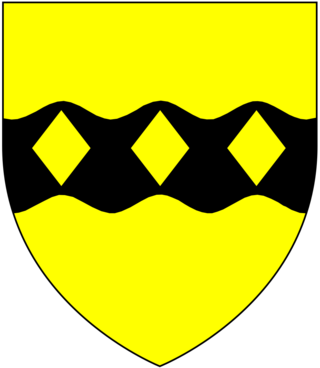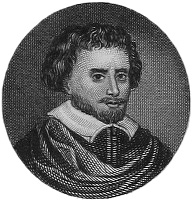Related Research Articles
This article contains information about the literary events and publications of 1650.

Christopher Hatton, 1st Baron Hatton KB PC FRS was first cousin twice removed to the Elizabethan politician, Sir Christopher Hatton and a prominent Royalist during the reign of King Charles I of England.
Edward Phillips was an English author.

John Bramhall, DD was an Archbishop of Armagh, and an Anglican theologian and apologist. He was a noted controversialist who doggedly defended the English Church from both Puritan and Roman Catholic accusations, as well as the materialism of Thomas Hobbes.

John Rogers was an English Puritan clergyman and preacher. Described as a "grave and judicious divine" and considered one of the most awakened preachers of his era, according to the book, Lives of The Puritans.
Thomas Dring was a London publisher and bookseller of the middle seventeenth century. He was in business from 1649 on; his shop was located "at the sign of the George in Fleet Street, near St. Dunstan's Church."
Edward Martin, D.D. was an English clergyman, ejected President of Queens' College, Cambridge, and at the end of his life Dean of Ely.
Gerard Langbaine, the elder was an English academic and clergyman, known as a scholar, royalist, and Provost of Queen's College, Oxford during the siege of the city.

Edward Fisher was an English theological writer.
The Hartlib Circle was the correspondence network set up in Western and Central Europe by Samuel Hartlib, an intelligencer based in London, and his associates, in the period 1630 to 1660. Hartlib worked closely with John Dury, an itinerant figure who worked to bring Protestants together.
George Sondes, 1st Earl of Feversham KB was an English politician who sat in the House of Commons at various times between 1626 and 1676 and was then created a peer and member of the House of Lords.
Patrick Hume was a Scottish schoolmaster in London, author of the first commentary on the Paradise Lost of John Milton.

Edmund Ashfield was an English portrait painter and miniaturist, who worked in both oils and pastels.

Arthur Duck, Doctor of Civil Law (LL.D.) was an English lawyer, author and Member of Parliament.
John Spalding was a Scottish historian, possibly a native of Aberdeen.

Peter Barwick (1619–1705) was an English physician and author.
William Sherwin was an English engraver, one of the first to work with mezzotints.
William Robertson was a Scottish Hebraist. He was educated at Edinburgh University, taught Hebrew in London from 1653–1680, then in 1680 was appointed lecturer in Hebrew at Cambridge University.
William Barret was an English divine.

Thomas Cecil was an English engraver who worked entirely with the graver, and whose work flourished about 1630.
References
- ↑ "Baron, Robert (BRN645R)". A Cambridge Alumni Database. University of Cambridge.
- ↑ Knight, John Joseph (1885). . In Stephen, Leslie (ed.). Dictionary of National Biography . Vol. 3. London: Smith, Elder & Co.
- . Dictionary of National Biography . London: Smith, Elder & Co. 1885–1900.
- Attribution
![]() This article incorporates text from a publication now in the public domain : "Baron, Robert (fl.1645)". Dictionary of National Biography . London: Smith, Elder & Co. 1885–1900.
This article incorporates text from a publication now in the public domain : "Baron, Robert (fl.1645)". Dictionary of National Biography . London: Smith, Elder & Co. 1885–1900.